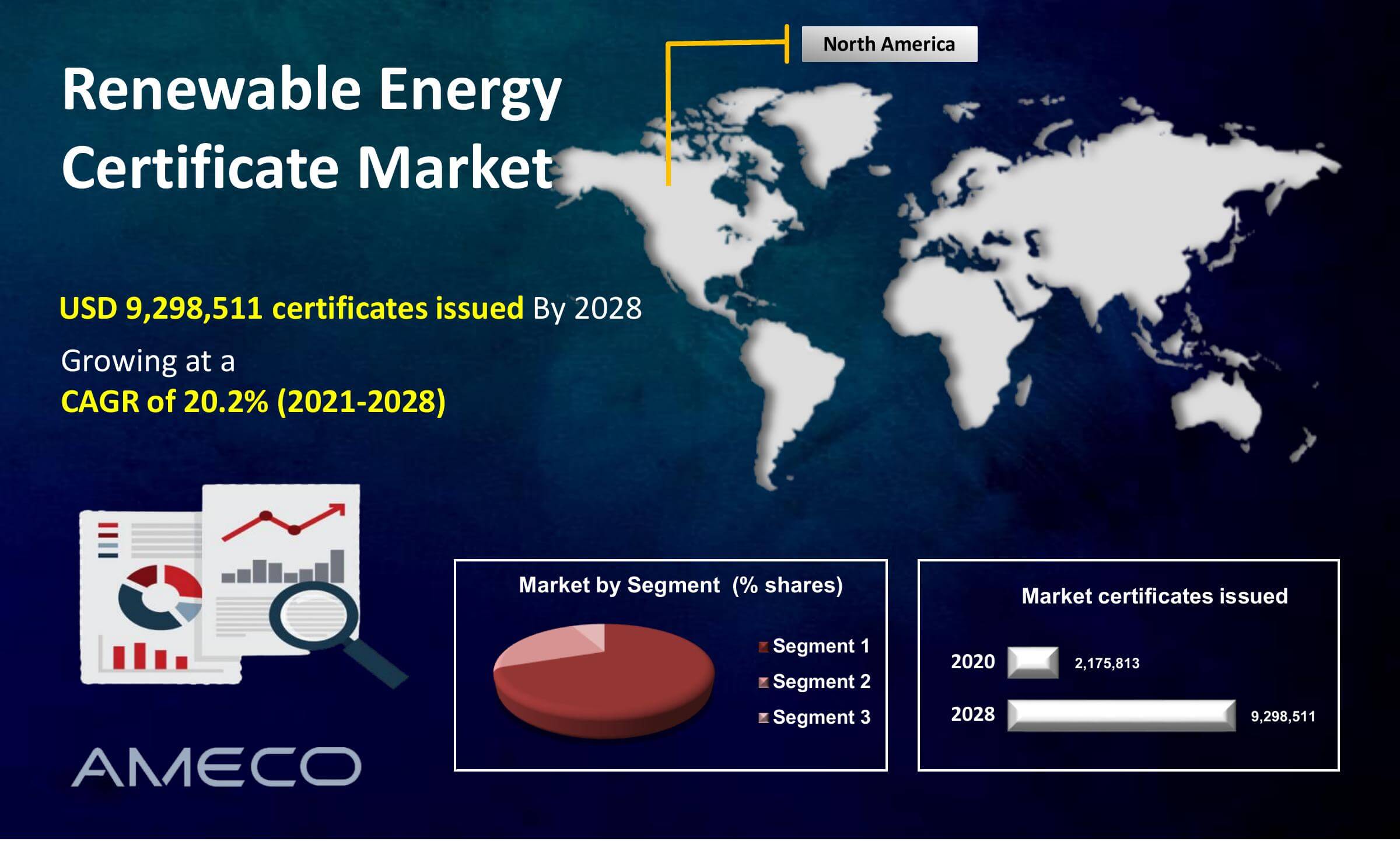Renewable Energy Certificate Market Growth Opportunities and Forecast till 2028
The global Renewable Energy Certificate Market is predicted to increase at a CAGR of 20.2% from 2021 to 2028, with 2,175,813 certificates issued in 2020 and 9,298,511 certificates issued by 2028.

The renewable energy certificate (REC) mechanism is a market-based tool for promoting renewable energy and ensuring that renewable procurement obligations are met (RPO). It aims to reconcile the discrepancy between the availability of renewable energy supplies in the state and the responsibility of obliged companies to meet their renewable purchase obligations (RPO). A renewable energy certificate is a marketable, market-based document that embodies the authorized property rights to renewable electricity generation's "renewable-ness" or all non-power qualities. A renewable energy certificate (REC) can be sold independently from the real electricity (kWh, or kilowatt-hour). The only person who may declare that the renewable electricity linked with a REC being "used" or "powered with" is the REC owner. For every megawatt hour (MWh) of power generated and distributed to the electric grid from a renewable energy resource, a renewable energy certificate (REC) is issued.
|
Parameter |
Renewable Energy Certificate Market |
|
Renewable Energy Certificate Market Size in 2020 |
2,175,813 certificates issued |
|
Renewable Energy Certificate Market Forecast By 2028 |
9,298,511 certificates issued |
|
Renewable Energy Certificate Market CAGR During 2021 – 2028 |
20.2% |
|
Renewable Energy Certificate Market Analysis Period |
2017 - 2028 |
|
Renewable Energy Certificate Market Base Year |
2020 |
|
Renewable Energy Certificate Market Forecast Data |
2021 - 2028 |
|
Segments Covered |
By End-Use, and By Region |
|
Renewable Energy Certificate Market Regional Scope |
North America, Europe, Asia Pacific, Latin America, and Middle East & Africa |
|
Key Companies Profiled |
Environment Protection Agency (EPA), Western Area Power Administration (WAPA), Central Electricity Regulatory Commission (CERC), General Services Administration (GSA), Bonneville Environmental Foundation, and Renewable Choice Energy |
|
Report Coverage |
Market Trends, Drivers, Restraints, Competitive Analysis, Player Profiling, Regulation Analysis |
Market Dynamics
More government commitment to renewable energy, increased investment in project development, and increased consumer awareness are likely to propel the worldwide renewable energy certificate market forward. The government is enacting a number of policies to encourage the usage of renewable energy sources. Renewable energy certificates, a market-based method, were recently released in India. However, partaking in the REC markets has been limited in the first year of trading: RECs have botched to attract investment. The rise in power demand around the world, as well as government laws encouraging businesses to meet renewable energy objectives are also propelling the industry demand. Furthermore, rooftop solar panels, micro wind turbines, and micro hydropower plants are all increasing their market share, which is propelling the market forward.
The government's effort to resolve the energy crisis and stabilize the economy is likely to boost the global market for renewable energy certificates. Players are flocking to put up clean energy projects in emerging economies because of favorable economic policies. India is becoming a favored destination for renewable investment, according to ORF statistics, with roughly US$ 64 billion invested in the renewable energy sector in the last six years. The costs of creating, financing, maintaining, and running power plants and the electricity grid in general are reflected in energy prices (the complex system of power transmission and distribution lines). Some for-profit utilities include a financial return for its owners and shareholders in their electricity pricing.
Market Insights
End-use and geography are the segments of the worldwide renewable energy certificate market. The end-use segment is split into wind, solar, hydropower, geothermal, biomass, and others (biofuels and fuel cells). Based on end-use, the hydropower segment occupied a substantial market share in 2020. Hydroelectric energy, often known as hydropower or hydroelectricity, is a form of energy that creates electricity by binding the power of moving water, such as water flowing over a cascade. People have been exploiting this force for millennia. Hydropower presently accounts for 37% of total renewable electricity output and 7% of overall electricity generation in the United States.
Worldwide Renewable Energy Certificate Market Industry Regional Rivalry
North America, Asia-Pacific, Europe, the Middle East & Africa, and Latin America are the regions in which the worldwide renewable energy certificate Market is divided. The North American region held the biggest market share of all regions in 2020. For the purposes of Scope 2 accounting, North America is a single market, which means that a REC can be purchased and claimed at any location inside the United States and Canadian territory. Organizations can assist promote demand for renewable energy by investing in RECs, which encourages the development of new renewable energy projects while also providing project owners with additional cash beyond the sale of the project's electricity. Renewable energy certificates (RECs) can be used to achieve voluntary goals or requirements, such as renewable portfolio standards (RPS).
Global Renewable Energy Certificate Market Industry Segment Analysis
Market By End-Use
· Solar
· Wind
· Geothermal
· Hydropower
· Biomass
· Others (Biofuels and Fuel cells)
Renewable Energy Certificate Market Major Companies
This division of the report classifies the market's leading companies. Environment Protection Agency (EPA), Western Area Power Administration (WAPA), Central Electricity Regulatory Commission (CERC), General Services Administration (GSA), Bonneville Environmental Foundation, and Renewable Choice Energy are the major players mentioned in the report.
Renewable Energy Certificate Market Regions
North America
· U.S.
· Canada
Europe
· U.K.
· Germany
· France
· Spain
· Rest of Europe
Latin America
· Brazil
· Mexico
· Rest of Latin America
Asia-Pacific
· China
· Japan
· India
· Australia
· South Korea
· Rest of Asia-Pacific
Middle East & Africa
· GCC
· South Africa
· Rest of Middle East & Africa